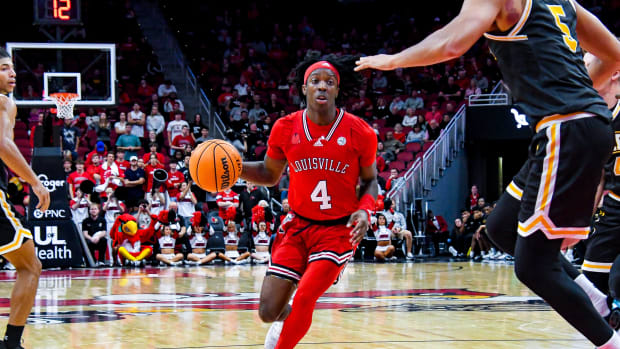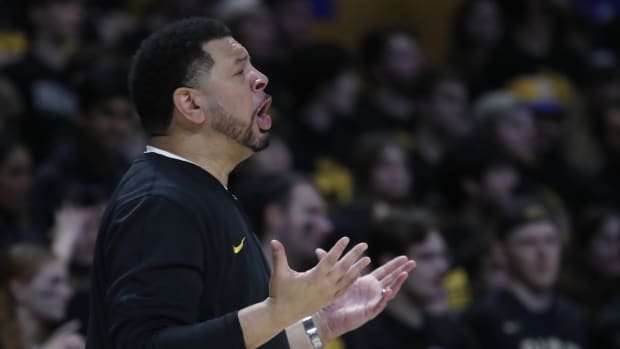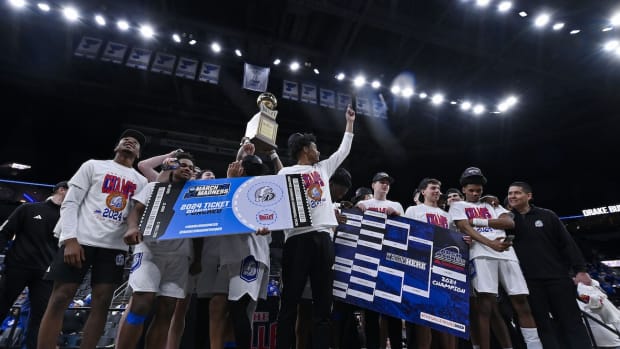In her retelling of the story, Kim Mulkey is standing at the front of the room before members of LSU’s marching band.
Hired as the Tigers’ new women’s basketball coach in April, this is her introduction to the famous Golden Band from Tigerland, a group notorious for playing a sample of the 1984 hip hop song, “Talkin’ Out Da Side of Ya Neck.” “Neck,” as it is referred to in Baton Rouge, is beloved here and also blacklisted during games because of the vulgar chant that students and fans attach to it when played.
While addressing band members for the first time, Mulkey is moving through her normal talking points, but the band seems uninterested. She needs something to fire them up, to light a spark.
So, she stops mid-sentence, looks around the room and says, “Well …?”
Brows furrow. Eyes squint.
“Well … ?” she says again.
Confused band members mutter to themselves. Well, what?
“Well,” Mulkey repeats, her voice now rising.
“I was promised,” she yells, “that y’all would play ‘Neck!’”
The room burst into roars, “Neck” was indeed played, and Mulkey had won over yet another group of people at her new school.
Yes, Mulkey seems to be fitting in quite nicely here, back in her home state, where that illustrious career of hers first started.
Her office fridge, for instance, is full of Barq’s root beer. And lunch is normally a po’boy or a muffuletta. One morning recently, she uncorked the top of a jar of Cajun-spiced pickles and popped a few into her mouth. Forget that it is 9:30 a.m.
Well before she coached a single game here, Mulkey was treated like a queen, riding around in her comp vehicle, the most luxurious of white SUVs.
But just because she has a new job doesn’t mean she is a changed woman. Her emotions still run high. Her passion still oozes. It’s a combination that has brought success and controversy.
Entering the first year of an eight-year, $23.6 million contract with LSU, Mulkey sits behind only UConn’s Geno Auriemma and South Carolina’s Dawn Staley with the third-richest contract in the sport—something three national championships and one dozen conference titles at Baylor affords.

Mulkey, 59, was born in California but grew up in Tickfaw, La., about 50 miles from LSU's campus in Baton Rouge.
Peter Forest/Getty Images
She still brings her brash style (her on-court outfits are show-stopping and meme-worthy) and prides herself on not being politically correct, something she views as a sort of badge of honor (in the aftermath of BU’s sexual assault scandal, Mulkey said those parents unwilling to send their daughters to the school should be knocked in the face, a comment for which she ultimately apologized).
She can be blunt to the point of awkwardness and candid to the point of discomfort. (Mulkey, for instance, suggested at this year’s Final Four that the NCAA “should dump COVID testing.”)
To Mulkey, she’s just being herself, even if at times it comes across as insensitive.
If she’s brazen off court, she’s brilliant on it. On Tuesday night, Mulkey coached for a program other than Baylor for the first time in more than two decades, tipping off her LSU tenure with a 82-40 win over Nicholls State and sharing that debut with her family in the crowd.
It marked her embarking on a somewhat unprecedented mission, leaving behind one of the most dominant dynasties in NCAA history, regardless of sport, for a new challenge.
There are rarely any secrets with Kim Mulkey, few buried truths or real mysteries.
Except one.
Before April 2021, no NCAA football or basketball coach had ever left a program where they won multiple national championships during a tenure of at least 10 years for another college job.
And then along came Kim.
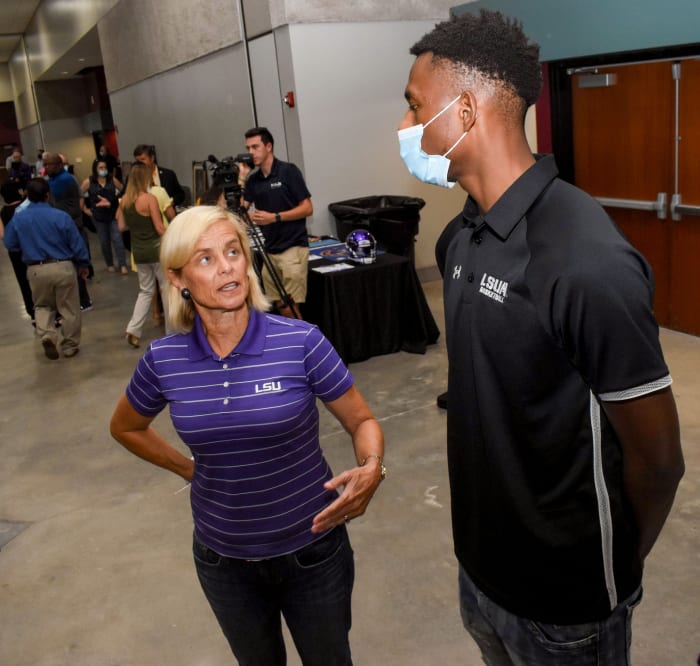
Mulkey's arrival in Baton Rouge has been well-received within the athletic department. Said Woodward at the time of her hiring: "We look forward to working with her as she instills that championship culture at LSU."
Melinda Martinez/The Town Talk/USA Today Network
Few people possess gate access into the belly of Tiger Stadium, LSU’s 97-year-old concrete football cathedral. One of those people is Kim Mulkey.
“Look at this,” the coach says, as she reaches for a remote from the captain’s seat of her white SUV.
She hits a button and the massive black gates of the stadium’s south end zone structure slowly creek open. Mulkey rolls into this fortress of football, weaves through some unoccupied beer carts and parks in a designated spot—the only vehicle allowed in here—a few strides from an elevator, the entrance to her temporary lair. LSU’s traditional women’s basketball offices are under renovation. They were not good enough for Mulkey. She demands perfection, much like the man who once occupied her very same office suite: Nick Saban.
In many respects, Mulkey is attempting to resurrect this sleeping giant as Saban did for the football program here 20 years ago. Once a powerhouse in the SEC, the LSU women’s basketball program has slipped into mediocrity, missing three of the last five NCAA tournaments and finishing no better than fourth in the league over the past decade—a fall that began with a sex scandal involving coach Pokey Chatman in 2007.
Mulkey’s motto is painted in giant letters above the team’s practice gym: “Respect the past; Embrace the future.” The first three words are scrawled across a backdrop that features the face of former coach Sue Gunter, who helped build a program that made five consecutive Final Fours from 2004–08. The last three words are positioned near an image of Mulkey and new LSU president William Tate IV.
In just a few short months, Mulkey’s impact here is obvious. Season-ticket sales hit a record at nearly 4,500, five times what they were in 2019–20. The program’s Fast Break Club, a booster organization, was at 22 members when Mulkey arrived. It’s now at 183.
In her first six months in Baton Rouge, Mulkey raised around $1 million, funds to renovate the offices and make other improvements. She keeps in her desk drawer a spreadsheet of each person who donated. She calls every one of them, checking off the name as she goes.
She’s a master saleswoman with boosters as well as high school prospects. The Tigers are hosting recruits who normally would never consider playing for a program that won eight games a year ago.
“They know my history,” Mulkey quips.
At a recent staff meeting, Mulkey is perky and happy while discussing the latest recruiting targets with her assistants. Attention then turns to the current team. She swivels her chair around to a big-screen TV where the day’s last practice flickers onto the screen. She sighs. “I go from happy to pissed off in a matter of seconds.”
At LSU, this is not a reload situation. It is a rebuild.
This year’s team works hard and has its strengths, she says, but let’s be honest, it does not possess the skill she left in Waco.
“There’s got to be a grace period,” she says. “It’s not going to happen overnight.”
A few days into preseason practice, her team is still trying to figure out her personality. She’s in your face, often angry but also hilarious, frequently cracking jokes to her new group of players.
“They don’t know yet when to laugh and when not to laugh,” Mulkey chuckles.
At one point during a team practice, she tells players they are giving her “the red ass.” In another fiery moment, she barks at players that she’d rather them shoot a brick than an air ball. “Knock the whole damn backboard down if you want,” she yells, “just don’t shoot an air ball.”
She’s brought here the same regimented system she used over 21 years at Baylor, where her teams won 632 games. Seventy percent of her practices are devoted to defense—almost always man-to-man. In an age of perimeter obsession, her offense is built around ball control and movement that begins inside, an old-school strategy that still works.
“She’s run the same plays for the last 20 years,” says Kyle Robarts, her former sports information director at Baylor. “It’s other peoples’ jobs to stop them. They can’t.”
The mentality she hopes to establish in Baton Rouge is the one she learned just 50 miles east of here. Mulkey is from Tickfaw, described as a “village” because of its low population: 764. She grew up visiting LSU for camps and football games. In fact, LSU’s game against Auburn on Oct. 2 was her first football game in Tiger Stadium since she was a high school senior.
She was never a big fan of Mardi Gras. In her 59 years on this Earth, she’s never consumed a single drop of alcohol, she says, because she’s afraid she might like it too much. In south Louisiana, she knows that will be tested. For instance, in her office fridge are a dozen memorialized bottles of beer specially made to honor LSU’s 2019 football championship. She displays them for appearances. In her new renovated office, the school has insisted on putting in a wet bar, because that’s how they operate here.
In fact, after her opening news conference in April, the school celebrated with a party that featured two fully stocked bars. Her assistant coaches, previously with her at Baylor, were astonished. There are wet bars here with athletes present?!
Mulkey laughed at them.
“Honey,” she told one, “you’re not in Waco anymore.”
In 1924, after his ninth season coaching Pittsburgh, Pop Warner, the namesake of the American little league association, left the school after nine seasons for Stanford. He’d won three national championships at Pitt and had produced four undefeated seasons. He’d later write that he left for a change in climate. It was nicer on the Pacific Coast. Warner represented the last instance of a coach in one of the NCAA’s two major sports, football and basketball, to leave a major conference school for another college after they won multiple national championships at the first stop.
Nearly a century later, Kim Mulkey’s departure to Baton Rouge wasn’t weather-related.
Mulkey points to various reasons for her unprecedented decision. She chalks it up mainly to a desire to “go home” and end her career in a state where it began, where her two children were born and where she claimed six championships, four in high school and three at Louisiana Tech, as a player and an assistant coach.
She is hoping to blaze a path for future Louisianians to remain in a state that often ranks toward the bottom nationally in economic matters. “I grew up here,” she says. “I want people to see me do good things here and think, ‘You know what? I can stay home in Louisiana and do good things here, too.’”
But there’s more to this story, right?
“Look,” Mulkey says, “I never expected to leave Baylor, but it was timing. My kids are grown and raised.” She pauses. “And Baylor has a new administration.”
Mack Rhoades arrived as the athletic director at Baylor in the summer of 2016, in the midst of Mulkey’s most dominant run at the school. She had recently polished off a third straight trip to the Elite Eight and had claimed a sixth consecutive Big 12 regular season championship (astonishingly, she’d win five more in a row to end her career there).
Rhoades, well-respected by his peers as a 25-year veteran in the industry, was hired to reform an athletic department left in disgrace after the sexual assault scandal during Art Briles’s coaching tenure. A year later, Linda Livingstone, a former business professor at Baylor, returned to the school as its president. Reshaping Baylor’s image had begun, including a structural reformation limiting the authority of the Baylor Board of Regents, previously heavily involved in athletic affairs.
As the leader of the athletic department, Rhoades asserted control in a much different way than his predecessor, Ian McCaw, a more agreeable personality.
For years, Mulkey served not only as Baylor’s women’s basketball coach but also as the face of the athletic department and university, the most vocal and recognizable public supporter of the Bears through two of the NCAA’s most scandalous episodes—the player murder under men’s basketball coach Dave Bliss and the football scandal.
Her authority, respect and connections on campus were extensive. Through powerful friends and incredible successes, Mulkey had freely maneuvered for years. Her following on campus—“Kim’s Army,” some refer to it—was deep-pocketed and influential.
“Kim built a cult following of incredibly loyal fans who loved her, the players and the winning,” says David Smoak, a longtime journalist covering Baylor and the voice of a popular Waco radio program. “She was there when Baylor was deep in the hole and trying to overcome an embarrassing time in athletics. She was the beacon of hope who helped and showed Baylor and their fans they could win championships. She was the General.”
What unfolded between Rhoades and Mulkey is described not as a power struggle as much as a personality clash—two strong-willed people operating within the same orbit. One was the boss harnessing an employee; the other an employee used to being the boss.
By many peoples’ definition, Mulkey is a polarizing figure, something that can be traced back to her controversial public comments.
“It sometimes gets her in trouble, because if you ask her what she thinks, she’s going to tell you,” says Jan Nimo, a retiree and former president of Mulkey’s tip off club.
In 2017, in the aftermath of BU’s sexual assault scandal, Mulkey said those parents unwilling to send their daughters to the school should be knocked in the face. She later said, “I’m sorry for the choice of words. The timing wasn’t good. ... I coach with emotion. I played with emotion, and it was an emotional moment. I guess you’d say it got the best of me because I really do love this place.”
One of Mulkey’s most famous players, Brittney Griner, told ESPN in 2013 that she remained closeted during her Baylor career after coaches suggested players keep their sexuality private. And this past spring, Mulkey urged the NCAA to stop testing athletes for COVID-19 during the women’s basketball Final Four.
“I don’t say things that are politically correct,” she says, “… I don’t mean disrespect. I don’t mean to hurt anybody. I speak from my heart.”
If she’s unafraid publicly to express strong views and opinions, what must she be like privately?
“She lets people know if her program or kids aren’t being treated properly,” Nimo says.
Those closest to Mulkey say the coach you see angrily pacing the court during games is a kind, warm and caring person. Yet, even they know she is not someone to be trifled with.
“To put it bluntly, Kim doesn’t put up with any B.S.,” says Jim Turner, the former chairman of the BU Board of Regents and a powerful booster who helped lead the search to hire the coach in 2000.
“Don’t do something bad against her,” Turner later says. “She will remember that. Don’t cross her in a way that is wrong. That’s not a line of fire I want to be in.”
Mulkey’s past is littered with examples. She has not spoken to her father since the 1980s because of his unfaithfulness to her mother (they’ve been divorced for years). Her children do not associate with him. When he showed up at her introductory news conference in Baton Rouge in April, LSU officials made sure he kept his distance.
Her husband is another matter. Randy Robertson left the family before their children, Makenzie and Kramer, reached high school age. He remains in Waco, and the two don’t talk.
Mulkey’s wake stretches back more than two decades. As an assistant at Louisiana Tech, Mulkey was poised to take over in 2000 for outgoing coach Leon Barmore. She wanted a five-year contract, but Louisiana Tech school president Dan Reneau would only agree to four years. So, she left for Baylor.
After winning her first national championship, Reneau sent Mulkey a congratulatory letter. She refused to open the letter and never responded. Why do I need to hear from that man?
Mulkey possesses the gene of most high-achieving coaches, those close to her say. She lives to win. She thrives in conflict and competition. She needs an enemy, desires a battle, they say.
Ahead of games, Mulkey worked to find even the smallest slight that an opponent, coach or player said to media members about her Bears, using it as fuel for her team and herself. Anything to get fired up.
“If you watch The Last Dance with Michael Jordan, you’d see how every day is a mountain to climb,” says Robarts, her former media assistant at Baylor who left the school in August. “She’s so competitive. I found her wanting things in a specific and certain way all the time that she was constantly fighting a battle. That’s what makes her who she is. LSU gives her a new mountain to climb.”
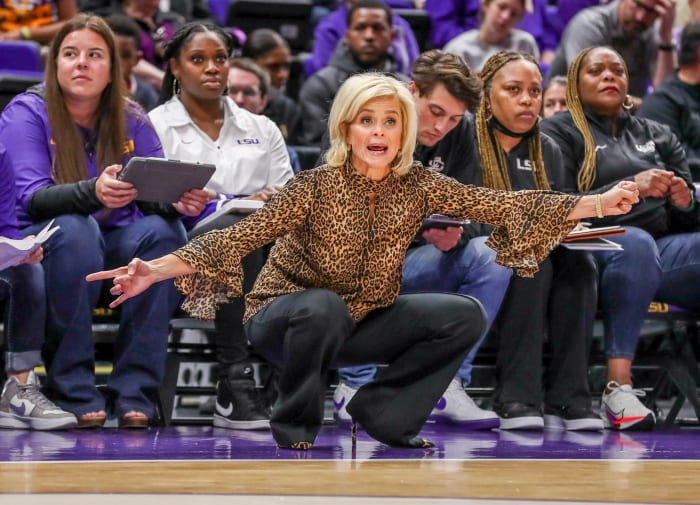
Mulkey hopes to lead LSU to its first national championship in the program's history.
Jonathan Mailhes/CSM/Shutterstock
On April 16, a day after LSU and coach Nikki Fargas split, Kim Mulkey appeared on a Baton Rouge radio show about her impending induction into the College Basketball Hall of Fame.
Asked by host Jordy Culotta whether she’d be open to a discussion about the LSU job, Mulkey left the door open in such a way that Culotta publicly pleaded on air for athletic director Scott Woodward to call Mulkey. “That sounded like a Louisiana person willing to listen to a conversation of bringing her back,” Culotta said after Mulkey signed off.
Little did anyone know, the wheels were already in motion. Woodward’s lieutenant, Stephanie Rempe, had contacted the Baylor administration about speaking to Mulkey. Days later, the school offered her their head coaching job.
Mulkey haggled over the decision for six days, meeting at least once with Rhoades. The coach, then the second-highest paid in the nation behind Auriemma, did not ask for a raise or a new contract, both Mulkey and BU officials confirm.
However, two long-standing issues sensitive to the coach arose: the location of the Baylor basketball teams’ new area (either on campus or in downtown Waco); and the name that was to be etched into the court whenever it was built. For at least two years, Mulkey had publicly and aggressively argued for the arena to be on campus. Many at and around Baylor agreed with her. Some, in power at the school, did not.
High-ranking athletic administrators and powerful boosters at Baylor had, in years past, agreed to put Mulkey’s name on the court, they tell Sports Illustrated. But the new administration sold the naming rights to another individual, something Mulkey believed was “a jab in the gut,” says one prominent Baylor official. The school announced in May that the court was being named for Mark and Paula Hurd, two donors who make a sizable donation to the new arena.
These issues, though, were not deal-breakers. So what was?
In Mulkey’s final conversations with Rhoades and Livingstone, neither Baylor administrator asked her to stay, sources close to the coach and school tell SI. They didn’t tell her to leave, either.
“It’s an unbelievable story,” says Greg Klepper, a Waco businessman, longtime supporter of Baylor women’s basketball and friend to Mulkey. “She’s the female Rupp of basketball and they let her go.”
Drayton McLane, an 85-year-old billionaire whose name is on the Baylor football stadium, is a close friend of Mulkey’s. She often confided in him when problems arose.
“I think she was upset it ended the way it did,” he says. “I think she was upset because she had such a great record and was highly respected, and I think she genuinely loved Baylor.”
Rhoades declined comment on questions about Mulkey’s exit, telling SI, “Baylor will always be grateful for her years [at Baylor] and the success and pride she brought to the university. Kim made a decision to go back home and we, Baylor, had done as much as we could to support her and the program. We couldn’t do anything beyond that.”
Her departure left a massive hole in central Texas. Kim’s Army had lost its leader.
“Some people ask, ‘How can a university allow a Hall of Fame coach to walk?’ ” Smoak says. “Some fans asked me why they didn’t name a street or the court after her or build a statue. I will always believe the court name was important to her.”
While acknowledging the issue over the court name, Mulkey says it wasn’t as important to her as others make it seem.
Mulkey’s legacy at Baylor is one that will likely go unrivaled. Outside of Auriemma’s powerhouse in Connecticut, she built the greatest and most stable women’s basketball dynasty in the past two decades.
Over the last few years, the program had reached the point that some describe as being on “autopilot.” That’s not to say Mulkey and staff didn’t grind—they did—but players were more easily attracted to Waco. One person compares it to the famous line from former NFL coach Bill Parcells: The groceries were delivered to Mulkey and she cooked the dinner.
Rebuilding a program at 59 years old is not necessarily what she had planned. And yet here she is, in a temporary office grinding away.
“I’m not afraid to fail,” she says. That’s probably because her life is bathed in successes.
“There are doubters who don’t think she can do it this late in her career,” says Chante’ Crutchfield, an LSU assistant who was Mulkey’s very first graduate assistant at Baylor. “They don’t know her. She has the same fire she’s always had.”
Members of the so-called Kim’s Army have no doubts. Within three years, they believe Mulkey will have the Tigers as one of the country’s best programs. Maybe they’ll even rival Baylor.
Whether Mulkey left Waco heartbroken is not up for debate—she did. In many ways, Baylor made the choice easy for her, says Cheryl Gaude, a longtime family friend who helped Mulkey raise her children and who still lives with the coach.
For the most part, Mulkey has moved on from Baylor, Gaude says. She’s placed the past in a metaphorical box and slid it under her bed. She’s back home now, with keys to Tiger Stadium, a fancy new contract, renovated offices and a program striving for a return to glory.
The LSU fan base and administration has wrapped its collective arms around their native daughter in a way that made Mulkey forget those emotionally trying six days she spent mulling over the decision. The outpouring she felt at her introductory news conference in Baton Rouge convinced the coach that this was, indeed, the right move.
After the news conference, in fact, Mulkey turned to Gaude with a rhetorical question.
“Why was I crying over Baylor?”
More College Basketball Coverage:




